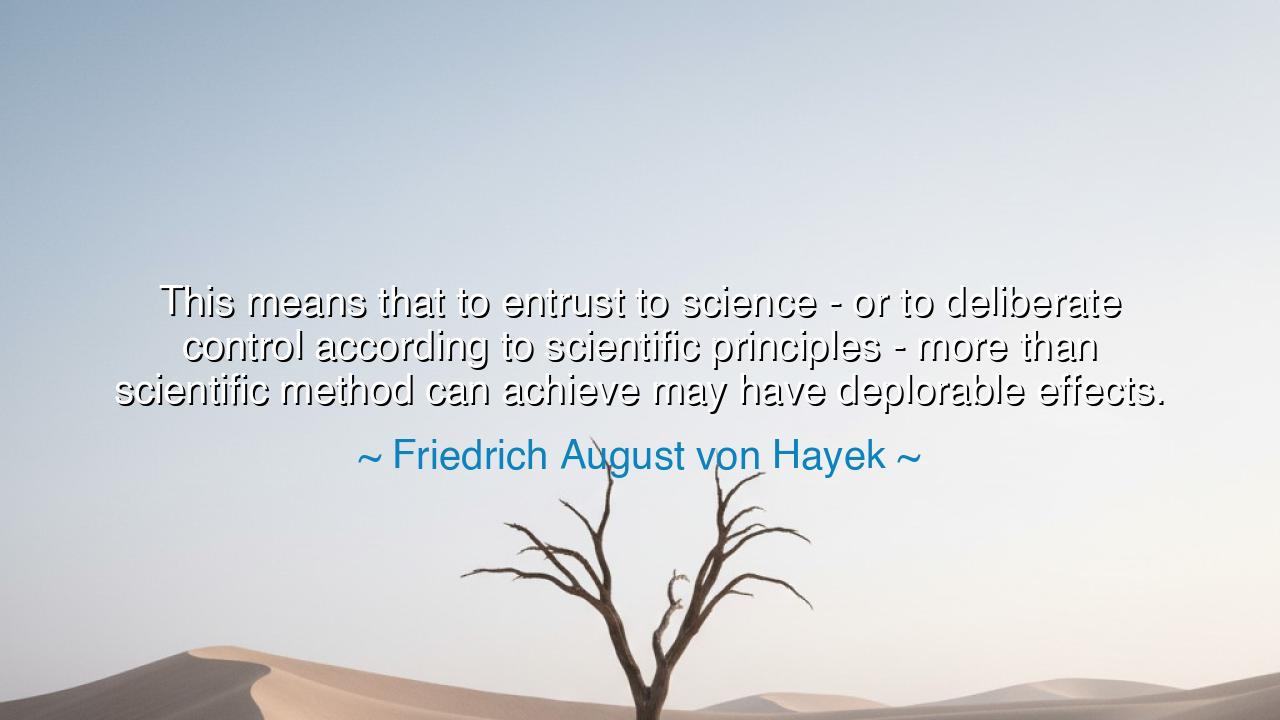
This means that to entrust to science - or to deliberate control
This means that to entrust to science - or to deliberate control according to scientific principles - more than scientific method can achieve may have deplorable effects.






“This means that to entrust to science – or to deliberate control according to scientific principles – more than scientific method can achieve may have deplorable effects.” Thus spoke Friedrich August von Hayek, economist and philosopher, who wrestled with the powers of knowledge and the limits of human reason. In this warning, he calls us to humility. For while science is mighty in its reach, precise in its methods, and wondrous in its revelations, it is not a universal master. To entrust it with more than it can achieve is to invite disaster. Science can measure, predict, and test; but it cannot, on its own, bear the full weight of human choice, morality, and freedom.
The origin of these words lies in Hayek’s battle against what he called the “fatal conceit”: the arrogance of believing that human societies can be wholly planned and controlled by reason alone. He saw in the 20th century how leaders, armed with the banner of scientific planning, sought to reorganize economies, cultures, and lives according to abstract formulas. Yet men and women are not cogs, and societies are not machines. The attempt to impose total order by the cold hand of science often led not to utopia, but to tyranny. Thus Hayek declared that scientific method has its limits, and that to ignore these limits brings ruin.
History gives us tragic proof. In the Soviet Union, central planners sought to direct every harvest, every factory, every trade, believing they could calculate society as one solves an equation. They trusted science as if it were omnipotent. But crops failed, shortages spread, and millions starved. What went wrong? Not the laws of science themselves, but the presumption that its methods could master the infinite complexity of human life. Here we see the meaning of Hayek’s warning: to overextend the authority of science is not wisdom, but folly.
Contrast this with the story of the Industrial Revolution in England. There, scientific discoveries in mechanics and chemistry gave birth to engines and factories. Yet progress came not from central control, but from a thousand experiments, failures, and innovations in the hands of free men and women. The science provided tools, but it was the spontaneity of society—the free exchange of ideas, the unpredictable creativity of individuals—that created wealth and transformation. Where science was respected within its limits, it became a servant of prosperity rather than a master of oppression.
The ancients knew this truth as well. Plato warned of the philosopher-king who, believing himself all-wise, might impose a rigid order on society. Aristotle cautioned that reason must always be balanced by practical wisdom, the judgment that arises from lived experience. Hayek echoes their wisdom: knowledge is great, but human life is greater still. Scientific principles can guide medicine, agriculture, and engineering, but they cannot dictate love, justice, or the countless small decisions that bind communities together.
Yet let us not misunderstand Hayek’s counsel. He does not despise science, nor deny its value. He honors it as a powerful method, the surest we have for understanding the material world. But he warns against turning science into an idol, demanding of it what it cannot give. Science can tell us how, but not always why. It can measure outcomes, but not define purposes. It can illuminate parts of the path, but not chart the whole journey of humanity.
So, O listener, take this lesson into your life: respect the power of science, but also respect its limits. Do not ask it to replace wisdom, morality, or the lived knowledge of communities. In your work, use scientific method where it applies—test, measure, refine. But in your choices, remember also justice, compassion, and humility. Trust not in formulas alone, but in the richness of human experience. For as Hayek reminds us, when we demand from science more than it can give, the results may not be glory but grief.






AAdministratorAdministrator
Welcome, honored guests. Please leave a comment, we will respond soon